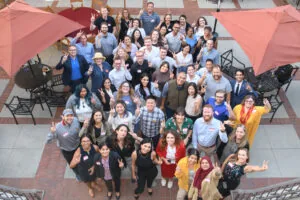Description
About 1.5 million Americans are getting a COVID-19 shot each day. At that rate, it might take until 2022 to get all Americans fully vaccinated. In addition, widely varying distribution strategies are creating significant disparities in who gets inoculated. How can we work towards improving vaccine distribution?
Join the USC Schaeffer Center for Health Policy & Economics, the USC Sol Price School of Public Policy and the USC School of Pharmacy for a discussion about the current state of vaccine distribution: what is working, what is not and where efforts should be focused. USC Schaeffer Center Director Dana Goldman will moderate the conversation with USC School of Pharmacy Dean Vassilios Papadopoulos; Schaeffer Center COVID Initiative Director Neeraj Sood; and Baltimore’s former health commissioner Leana Wen.
Who Will Benefit
– Those questioning if the U.S. should follow the U.K.’s single dose vaccine distribution model
– Medical professionals who want to explore possibility of public-private partnerships to distribute COVID-19 vaccines
– Those searching for strategical solutions to improve nation-wide inoculation
About Our Featured Faculty
Dana Goldman is the interim dean at the USC Sol Price School of Public Policy, as well as the Leonard D. Schaeffer Chair and Distinguished Professor of Pharmacy, Public Policy and Economics at USC. Goldman began serving in his new capacity as interim dean on July 1, 2020. One of his first initiatives is to establish the Price School Social Justice Advisory Board representing faculty, staff and students. He is an elected member of the National Academy of Medicine and the National Academy of Social Insurance – two of his field’s highest honors. He is the author of more than 300 articles and book chapters, and his research has been published in leading medical, economic, health policy and statistics journals. He has raised more than $100 million in funding from external sources — including more than $50 million from the National Institutes of Health. Goldman pioneered the “Netflix model” to improve access to prescription drugs and the value of reduced copayments for the chronically ill.
Professor Goldman has as a formal health policy advisor to the Congressional Budget Office, Covered California, National Institutes of Health and the Fred Hutchinson Cancer Institute. He serves on the editorial boards of Health Affairs and the American Journal of Managed Care and is founding editor of the Forum for Health Economics and Policy. His work has been featured in the New York Times, Wall Street Journal, Washington Post, The Economist, NBC Nightly News and other media. He is former director of ISPOR and ASHEcon and a co-founder of Precision Health Economics, a health care consultancy. Goldman received his B.A. summa cum laude from Cornell University and a PhD in Economics from Stanford University.
Vassilios Papadopoulos, DPharm, PhD, DSc (hon), was named dean of the USC School of Pharmacy in fall 2016. Before joining USC, he served as executive director and chief scientific officer of the Research Institute of McGill University Health Centre in Montreal, and as faculty, department chair and director of the Biomedical Graduate Research Organization at Georgetown University Medical Centre.
A noted scientist and innovative leader, Papadopoulos has published more than 350 papers, holds numerous patents, serves on many national and international advisory committees and boards of biotechnology companies as well as a consultant for the pharmaceutical industry. He is an elected foreign member of the National Academies of Medicine and Pharmacy in France, fellow of the American Association for the Advancement of Science, fellow of the American Association of Pharmaceutical Scientists and fellow of the Canadian Academy of Health Sciences.
Papadopoulos’ research focuses on understanding the cellular and molecular mechanisms responsible for the initiation and maintenance of steroid biosynthesis in the adrenal, gonads and brain, in health and disease. His research has direct applications in reproduction and development, aging, cancer and neurological and neuropsychiatric disorders.
Neeraj Sood, PhD, is professor and vice dean for research and faculty affairs at the USC Sol Price School of Public Policy and a founding member the USC Schaeffer Center. He is also director of the COVID Initiative at the USC Schaeffer Center. He has published over 100 papers in peer-reviewed journals in economics, medicine and policy, including JAMA, Quarterly Journal of Economics, Journal of Health Economics, Health Affairs, Journal of Policy Analysis and Management and Health Services Research. His work has been featured in media outlets, including The New York Times, Washington Post, U.S. News and World Report and Scientific American. Sood was the finalist for the 16th and 21st annual National Institute for Health Care Management Health Care Research Award, recognizing outstanding research in health policy. He was also the 2009 recipient of the Eugene Garfield Economic Impact Prize, recognizing outstanding research demonstrating how medical research impacts the economy.
Sood is on the editorial boards of the Journal of Health Economics, Journal of Policy Analysis and Management and Health Services Research. He is a research associate at the National Bureau of Economic Research and a board member of the American Society of Health Economists. Prior to joining USC, he was a senior economist at RAND and a professor at the Pardee RAND Graduate School.



